
What you eat, and the vitamins and nutrients that your diet supplies, can have a dramatic impact on how your skin looks and feels.
Beauty begins from within. Your diet makes a huge difference in the appearance of your skin, and adding particular vitamins to your diet can dramatically change how your skin looks and feels.
Many vitamins can be applied topically to the skin with creams and serums — but taking vitamins orally, whether it’s through your diet or in the form of supplements, allows them to work their magic all over your entire body instead of just your face.
For gorgeous glowing skin, here are the vitamins you should be adding to your diet.
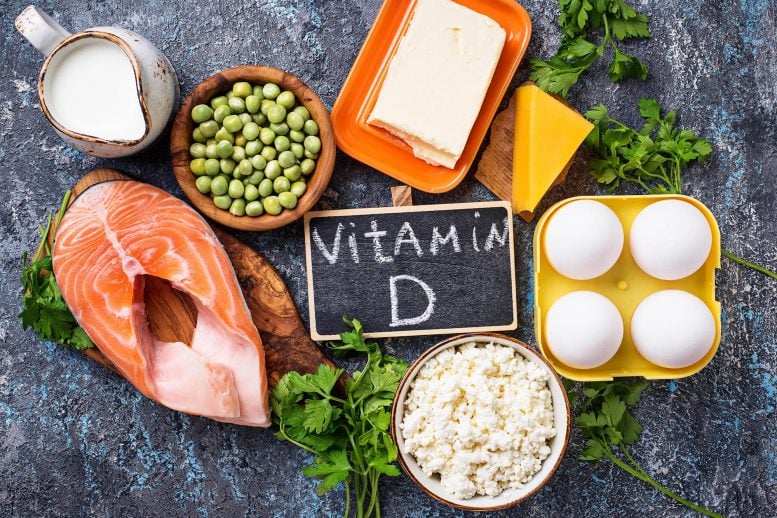
Although your body can generate vitamin D after sun exposure, this might not be best for your skin. Foods rich in vitamin D include fatty fish and fortified milk.
Vitamin D
Vitamin D is often called the sunshine vitamin, thanks to our body’s ability to produce it through sun exposure. However, sun exposure comes with other risks to your skin, including premature aging, sunspots, and an increased risk of skin cancer — so what is the best way to get enough vitamin D?
Vitamin D is a fat-soluble hormone found in fatty fish and dairy — and thanks to its antimicrobial and anti-inflammatory properties, it’s great for acne and red, inflamed skin. Despite its great health and skin benefits, vitamin D deficiency is one of the most common nutritional deficiencies all over the world.[1]
What makes vitamin D so special? It’s been shown to protect skin from aging, with patients with high levels of vitamin D showing DNA that is the equivalent of five years younger than those with lower levels.[2] Acne sufferers are also likely to have less vitamin D in their systems — and supplementing with vitamin D can improve their skin.[3]
Where to find it: Salmon, tuna, orange juice, milk, and mushrooms.
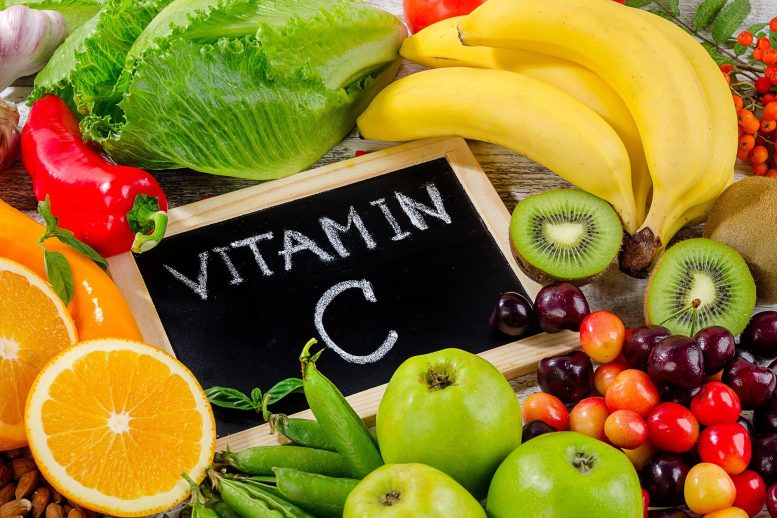
When it comes to vitamin C, most people think of citrus fruits such as oranges, grapefruit, kiwi, and lemon. While citrus is indeed an excellent source of vitamin C, you can also get it from bell peppers, chili peppers, strawberries, spinach, and broccoli.
Vitamin C
You likely already have a healthy helping of vitamin C in your diet — but with how effective this vitamin can be when it comes to your skin, there’s a strong argument for adding more, via either supplements or particular foods.
Vitamin C comes with an entire laundry list of benefits to your skin, including brightening and redness reduction, reducing the appearance of under-eye circles, reducing hyperpigmentation, and more.[4]
Vitamin C may also boost collagen production — ideal for anti-aging. Collagen reduces the appearance of sagging or loose skin and reduces the appearance of fine lines and wrinkles.[5]
It’s good for more than just glowing skin, too: taking vitamin C can help reduce stress, help shorten colds and flu, and potentially even help protect against strokes.[6]
Where to find it: Tomatoes, spinach, broccoli, and peppers.
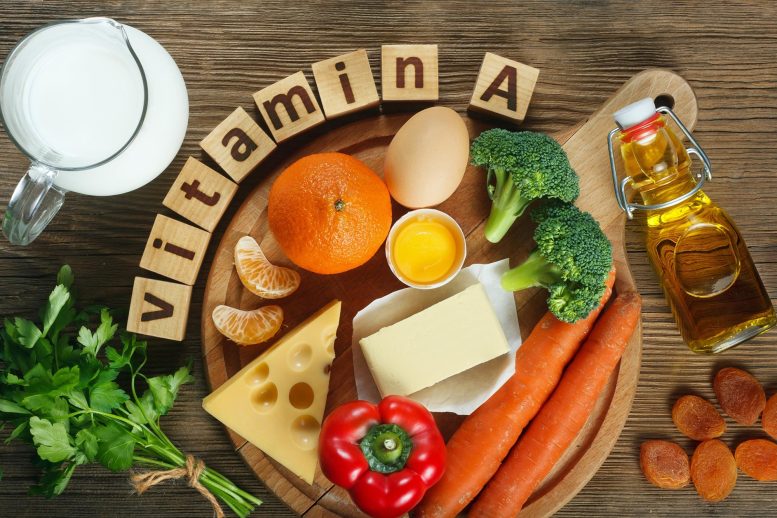
Vitamin A is critical for healthy lowing skin, and is found in red bell peppers, carrots, and cheese.
Vitamin A
When it comes to glowing skin, vitamin A is a superhero. It helps the production of fresh new skin cells — but that’s not all.
Vitamin A contains retinoids, which are compounds that fight signs of sun damage like hyperpigmentation, promote wound healing and cell turnover, and boost the production of collagen. In fact, studies show that people with a higher concentration of vitamin A in their skin look younger than those with a lower concentration.[7]
Vitamin A also acts as an exfoliant, getting rid of dry skin, improving your skin’s overall tone, and giving it a smoother texture.[8] Plus, it’s a great ally in the fight against acne: it helps normalize oil production and prevents clogged pores. In fact, it’s so effective that prescription-strength vitamin A is FDA-approved as a treatment for acne.
Where to find it: Sweet potatoes, red bell peppers, eggs, salmon, and yogurt.
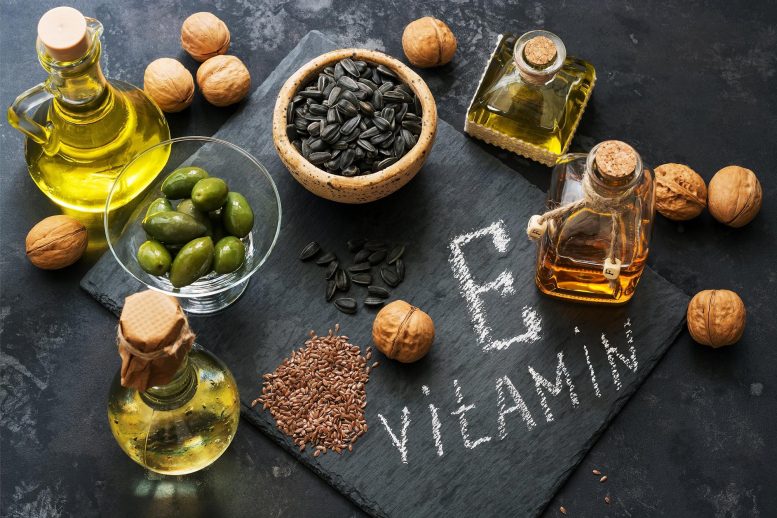
To add more vitamin E to your diet, eat foods like sunflower seeds, pistachios, almonds, and olives. Sunflower, safflower, and soybean oil also has vitamin E.
Vitamin E
Vitamin E is a powerful antioxidant and anti-inflammatory and can be applied topically, taken as part of a supplement, or added to your diet through vitamin E-rich foods.
Thanks to being high in antioxidants, vitamin E is great for blood circulation, which can help your skin feel firmer and healthier. Because vitamin E promotes cell turnover and regeneration, it is also sometimes used to treat acne scarring and dry skin.
On top of all of its other benefits, vitamin E helps strengthen and protect your skin’s barrier, protecting it from the sun and preserving your skin’s moisture barrier.[9]
Besides protecting and strengthening your skin, vitamin E may reduce your risk of heart disease, improve your lung health, and even help alleviate menstrual cramps.[10] Not bad for one little vitamin.
Where to find it: Hazelnuts, pine nuts, peanuts, avocado, and mango.
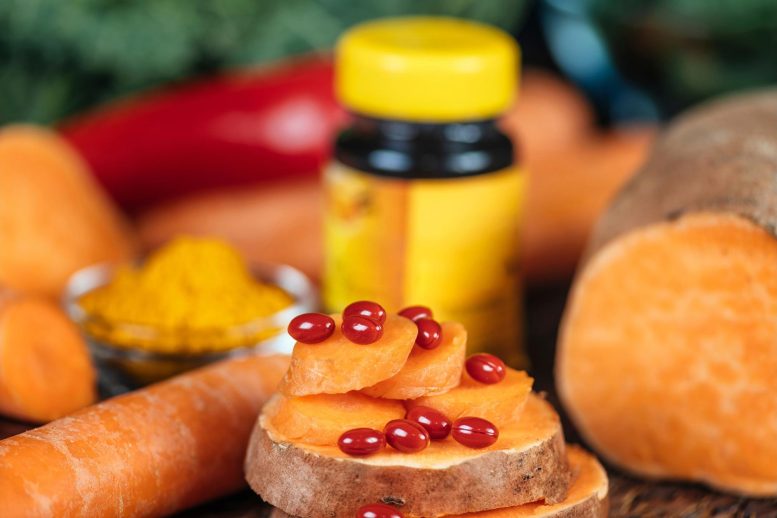
Carrots and sweet potatoes are good sources of beta-carotene, and you can also get this powerful antioxidant from supplements.
Beta-carotene
When it comes to your skin, the sun is a double-edged sword. While sunshine is good for us, and many people love the look of a healthy tan, sun damage is one of the worst offenders for prematurely aged skin.
That’s where beta-carotene steps in. Found in carrots, leafy greens, and cantaloupes, beta-carotene makes your skin less sensitive to sunlight. Of course, this does not mean you can skip the sunblock — but beta-carotene can offer a little bit of extra protection.
Beta-carotene does more than just protect your skin from the sun — studies have shown that it can also slow cognitive decline, and it’s a powerful antioxidant.[11]
Where to find it: Carrots, cantaloupes, squash, pumpkin, and sweet potatoes.
Beauty is more than skin deep — the vitamins you get through your diet are just as, if not more important than the creams and serums you apply to your face. With a vitamin-rich diet, not only will your skin glow all over, you get to enjoy other health benefits too.
References:
- Chauhan, Krati et al: “Vitamin D”, 7 March 2022, ncbi.nlm.nih.gov/books/NBK441912/
- Tschinkel, Arielle: “Here’s how a vitamin D deficiency might affect your skin”, January 29 2019, insider.com/how-does-vitamin-d-affect-your-skin-2019-1#healthy-vitamin-d-levels-might-help-prevent-skin-from-prematurely-aging-but-theres-an-important-caveat-4
- Lim, Seul-Ki et al: “Comparison of Vitamin D Levels in Patients with and without Acne: A Case-Control Study Combined with a Randomized Controlled Trial”, August 25 2016, ncbi.nlm.nih.gov/pmc/articles/PMC4999291/
- “11 Reasons to Add Vitamin C Serum to Your Skin Care Routine”, November 15 2021, healthline.com/health/beauty-skin-care/vitamin-c-serum-benefits
- “11 Reasons to Add Vitamin C Serum to Your Skin Care Routine”, November 15 2021, healthline.com/health/beauty-skin-care/vitamin-c-serum-benefits
- Zelman, Kathleen M.: “The Benefits of Vitamin C”, March 15 2022, webmd.com/diet/features/the-benefits-of-vitamin-c
- Darvin, Maxim E. et al: “The Role of Carotenoids in Human Skin”, December 16 2011, ncbi.nlm.nih.gov/pmc/articles/PMC6264659/
- Rud, Melanie: “Vitamin A for Skin: The Complete Guide”, January 11 2022, byrdie.com/vitamin-a-for-skin-5101059
- Dancer, Rebecca: “A Beginner’s Guide to Vitamin E and What It Does for Your Skin”, March 3 2022, allure.com/story/vitamin-e-skin-care
- “8 Unique Benefits of Vitamin E”, January 19 2022, healthline.com/health/all-about-vitamin-e
- “Benefits of Beta Carotene and How to Get It”, August 13 2020, healthline.com/health/beta-carotene-benefits




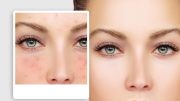

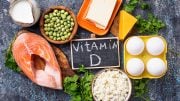

Be the first to comment on "5 Vitamins to Add to Your Diet for Healthy, Glowing Skin"